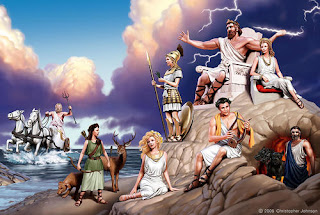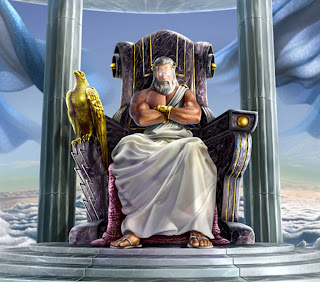Olympian Drama
If you had family drama; yours don't compare with Olympians. They were the first soap opera drama. As gods, the Olympians, and in particular the twelve council
members have extremely diverse personality traits that match with the realms
and /or concepts that they represent. For instance, Zeus is typically stern, to
the point, often abrupt, and authoritative, which coincides with his being the Ruler
of the Sky and the Gods. His sister, Demeter, on the other hand is shown to
have a motherly, picky, overbearing demeanor with an excessive obsession with her
daughter, agriculture and related products. Hades can be bitter and resentful
or calm and serene, which many humans typically view as an attitude appropriate
to the dead.
The twelve main Olympians do share several traits however.
The first and most important is that they are all easily offended. Almost all
of the gods that so much as sense a slight against them tend to react threateningly.
Each Olympian is also to some degree unconcerned of the
needs and desires of other gods, especially when they conflict with their own. Hera
disregard for certain elements of her family that threatened to unbalance her
perfect family image. Olympians forget about Ares being capture by giants for a
year until Hermes rescued and nursed him back to health.
Olympus is the residence of the divine family, the Twelve Olympians, also known as the Dodekatheon (Greek: Δωδεκάθεον < δώδεκα, dōdeka, "twelve"+ θεοί, theoi, "gods" are,the twelve most important ruling gods and goddesses of ancient Greece. There they all live together in an enormous city, high above the clouds. Mortals generally identified Olympus with Mount Olympus in Thessaly, which is the highest mountain in Greece, but very often it is identified also as some mysterious region far above the earth.
The entrance to Olympus is a great gate of clouds, kept by the Seasons. Within were the gods’ dwellings where they lived and slept and held court. In its great halls they feasted on ambrosia and nectar caters by Ganymede and Hebe and their team of cloud nymphs. They are entertained by Apollo, the Graces and the Muses.
Nectar is a sweet drink made from fermented honey, and ambrosia is said to be an uncooked mixture of honey, water, fruit, olive oil, cheese and barley, disgusting as that sounds according to Olympus inquirer. Others claim that a species of speckled mushrooms were the true food of the Olympians, created whenever Zeus' thunderbolts struck the earth, and that this was what kept them immortal. The Olympians were fond of the smell of roast beef and mutton, but didn't like the taste, so mortals would sacrifice sheep and cattle to them, but afterwards would eat the meat themselves. The deities who did not live on Olympus, such as the gods of the Underworld, the earth or the sea, would visit Olympus when summoned by Zeus.

The builders of the palace at Olympus were the Cyclopes, gigantic one-eyed Titans who were freed by Zeus from Tartarus and in thanks gave him his famous thunderbolts. Hephaestus, the Blacksmith of the Heaven, created all the furnishings and artwork on Olympus, even making some of the chairs and tables able to move themselves in and out of the celestial hall.
The palace of King Zeus and his wife Hera are located at the southern end of Olympus and overlooked the famous Greek cities of Athens, Thebes, Sparta, Corinth, Argos and Mycenae. At the northern end of the city, facing the wild hills of Macedonia, were found the restaurants, clubs, armory, workshops and the servants' community.
In between is a square court, open to the sky, with private palaces on either side belonging to the other five Olympian gods and five Olympian goddesses. Past the restaurants and servants' community were situated cottages for lesser gods, as well as the stables, chariot sheds, dog kennels and the Olympians' private zoo, where the deities kept their sacred animals.
Zeus held court at Olympus seated on an enormous throne of polished black Egyptian marble, adorned with gold or these days a pure platinum throne. Each of the seven steps leading up to it is enameled with one of the colors of the rainbow. A bright blue covering above symbolized that the whole sky belonged to Zeus alone. A ruby-eyed golden eagle perched on the right arm of his throne and a purple ram's fleece covered the cold seat. Zeus used this fleece for magical rainmaking in times of drought.
Queen Hera's throne was made of ivory, with three crystal steps leading up to it. Willow leaves and golden cuckoos decorated the back, and a full moon hung above it. Hera's seat cushion was a white cow skin, which she used to make rain when Zeus was too busy or couldn't be bothered to end droughts.
Zeus and Hera's thrones faced down the Council Hall towards the door leading into the open courtyard. Along the sides of the hall stood ten other thrones, five on each side, each one belonging to the other ten main Olympians. The male Olympians are on one side and the female on other side.
The first generation Olympians are the six children of the Titans, Kronos, and Rhea.
Oldest to youngest:
Hestia: Goddess of the Hearth, Home, and Family.*
Hades: God of the Dead; King of the Underworld.*
Demeter: Goddess of Agriculture and Seasons.
Second Generation Olympians
After the war against the Titans, several gods assumed thrones on Olympus, mainly the children of Zeus.
Aphrodite: Goddess of Love and Beauty, daughter of Ouranos.
Athena: Goddess of Wisdom, Battle and Strategy, daughter of Zeus and Métis.
Apollo: God of the Sunlight, Music, Archery and Prophecy; son of Zeus and Leto.
Artemis: Goddess of the Moonlight, Chastity and the Hunt, daughter of Zeus and Leto.
Ares: God of War and Conflict, son of Zeus and Hera.
Hermes: Messenger of the Gods and God of Travelers and Thieves, son of Zeus and Maia.
Dionysus: God of Wine, Drama and Madness, son of Zeus and Semele, mortal princess of Thebes.
Although they are technically Olympians, Hades did not hold a throne on Olympus due to being busy in the Underworld. Hestia renounced her throne when Dionysus was made a god to avoid a conflict among the council. They got back their thrones over the centuries.Homer says that no wind ever shakes the untroubled peace of Olympus; no rain ever falls there or snow; but the cloudless firmament stretches around it on all sides and the white glory of sunshine is diffused upon its walls.






















I would love Neptune, and Apollo.
ReplyDeleteWOOF
Ray